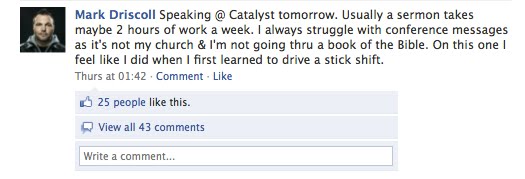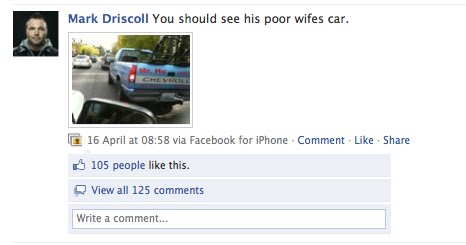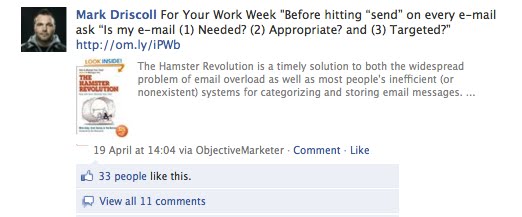I’m writing an essay at the moment on the following: Violence, Joshua, and the Christian. Quite apart from the fact that literary criticism of the Old Testament means we have no real sense of who wrote Joshua or when it was written, the question of what role the violence plays in the narrative is vexing. Did the Israelites actually carry out God mandated genocide of those in Canaan? And if they did, is that really a problem?
I’m going with no, and no.
Is God ordering genocide a problem?
Tackling the second question first – I have no problem with God carrying out judgment on his creation. The earth is his, and everything in it. If we all deserve death, and God is infinite, then who are we to quibble about the timing and manner of the inevitable and deserved end we face. Because death is the punishment for sin we’re all essentially facing genocide at that point.
The Canaanites were by all accounts particularly wicked people whose practices were frowned on by those in the nations around them (let alone God) their practices included incest, bestiality, child sacrifice and a fairly murderous militant culture. Presence in the promised land – for the Israelites – depended on them acting rightly, but their entrance into the land was due to the occupants acting wickedly.
Other people have a major problem with this notion – one scholar goes so far as to suggest that commands to kill the Canaanites came from Satan and the Israelites were too theologically illiterate to be able to tell the difference. Richard Dawkins calls the God of the Old Testament the nastiest character in fiction. Another school of thought thinks the violent rhetoric was just a tool to help Israel establish some (rather late – in the time of King Josiah) national identity. Which brings us to the second question.
Did the Israelites carry out genocide on the Canaanites?
No. They didn’t. They certainly killed some Canaanites as they moved into the promised land – but these would appear to be those Canaanites who stayed to pit their might against the people of God. Rahab’s little dialogue with the Jewish spies suggests the Canaanites knew full well what was coming. They had plenty of time to leave (forty years of wilderness wandering for the Jews). And God’s promises of possession for Israel were almost always coupled with a promise to “drive the people out” with only those who remained destined for destruction. This was not genocide – it was the destruction of a national identity. An identity that was synonymous with evil and loathed by the surrounding nations. We also see plenty of Canaanites appearing throughout the Old Testament after they’re meant to be wiped out. Clearly no genocide actually occured.
So what do we make of the commands for genocide then?
What I’m sure of is that we can dismiss the idea that these commands were somehow Satanic misdirection. Ordering the punishment of death for sin is completely consistent with God’s character in the New Testament. If we’re going to go with the notion of one God in both books – not a bipolar happy God/angry God then we need to read these passages in the light of Romans 3:23 and Romans 6:23 – we all sin, and thus we all deserve death. The Canaanites were no exception.
There is some merit in seeing the book of Joshua as some sort of identity building missive for the nation of Israel – an answer to the question of why they are God’s people living in a land God promised. At that point the theory that the language of violent conquest was a common sociological phenom is useful, but I don’t think it’s the primary purpose, because that essentially removes the need for some form of historical conquest, and doesn’t actually explain Israel’s presence in the land.
Questions about the historicity of a complete and total conquest – and people do ask those questions – are a bit silly, because Joshua demonstrates, in the narrative, that the conquest was neither complete or total. But it also shows Israel occupying the promised land – alongside those they were meant to wipe out.
The question I keep asking when I come back to passages like this is what theological purpose does it serve? I think this is my rubric for assessing every passage in the Bible, it comes before the question of “what historical fact does this teach”… and so, when I read Gary Millar’s commentary on Deuteronomy (Now Choose Life) I resonate more with his treatment of the issue than with the sociological view (Sociological readers of the Bible seem to have an incredibly low view of God’s sovereignty or ability to intervene – interpreting theological writings by looking for natural causes seems dumb to me. They almost always dismisses any miraculous intervention from God in establishing any identity – Israel’s identity, in their view, stems from their own self identity rather than from identity through God’s election). Millar even goes so far as to suggest some rabbinic hyperbole. Which is one of my favourite expresssions… here is his commentary on the instructions in Deuteronomy to wipe out the Canaanites (so that the Israelites may stay true to God. If they fail the author clearly says the Canaanites will lead the Israelites astray).
“This is theological preaching, urging Israel on to wholehearted obedience. In this context we should expect some hyperbole, at least.”
He argues that the Hebrew word הרמ (I can’t figure out how to do a final מ on my keyboard) – or herem – is a pointer to the theological nature of this destruction. Israel is to wipe out the idolatrous practices of the Canaanites, and their identity, rather than the people themselves.
Millar says:
“The intensification of the command to disposses the nations to destruction is not primarily about warfare at all. It is a theological conviction, arising from recognition that the Canaanites will be a snare in the land; their influence must be purged from the land if Israel is to survive.”
Deuteronomy 7 itself points to this sort of interpretation. Verse 1 says God will drive the nations out ahead of Israel, verse 2 that he will deliver them and the Israelites “completely destroy them” (that’s that Hebrew word), and verses 3-5 are instructions for what to do with the survivors (ie don’t marry them or worship their Gods). Why are there instructions for dealing with the survivors if they are to be completely wiped out?
Millar again:
“Throughout this chapter, it is clear that the Mosaic Preaching is concerned to bring the Israelites to the conviction that shattering the structures of Canaanite society is a theological necessity. This is expressed not in terms of driving out or dispossessing the Canaanites, but of destroying them.”
Regarding further instructions about the Canaanites in Deuteronomy 20 Millar acknowledges that the “leave no survivors” command is “startlingly literal” – but again suggests that the instructions are not simply about military victory but the annihilation of a way of life.
In the case of the Canaanites it seems the adage of “hate the sin, love the sinner” can’t really be carried out – because the two can’t be separated.















